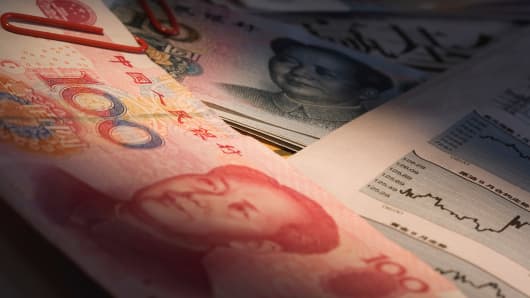China has been less vocal than other major economies in recent weeks in voicing discontent about a sharp slide in the yen, which means stronger currencies elsewhere. Yet, Beijing is taking action of its own to head off unwanted pressure on the yuan to appreciate.
The Chinese yuan, also known as the renminbi, fell on Thursday to its weakest level since late December. In fact, the yuan has been creeping down since January 14, when it hit a record high against the U.S. dollar at about 6.21, as China's central bank steps up its intervention in the foreign exchange markets to curb yuan appreciation.
"It is disappointing for anyone looking for yuan gains," said Sean Callow, senior currency strategist at Westpac Bank in Sydney. "The leash on the yuan has been tightening, probably because of the decline in the yen and also the decline in the (South Korean) won and the Taiwan dollar and in that environment it's tough for China to allow currency gains that would hurt its competitive edge."
The yen has tumbled against all major currencies since the start of the year, falling roughly 10 percent against the dollar and the euro, amid growing expectations of aggressive monetary policy from Japan, now on a concerted bid to revive a weak economy and end years of deflation.
The won meanwhile has eased about 2.5 percent against the dollar since the start of 2013, while the Taiwan dollar is down about 2 percent.
Policymakers in Europe and Asia, notably South Korea, have complained about the rapid depreciation of the yen. Indeed, analysts say a "currency war" is under way as major economies take action either verbally or through monetary intervention to weaken their currencies and keep them competitive.
(Read More: Currency Wars Return, 1930s Style: Who Will Lose Out?)
China's central bank sets a mid-point each day for the yuan exchange rate. Typically when the dollar falls against major currencies, the yuan is fixed stronger to reflect this. However, this has not been the case in the past two weeks when the dollar has weakened against the euro.
Currency analysts have forecast yuan appreciation this year to reflect the rebound in China's economy. A Reuters poll released this week showed 29 analysts forecast the yuan to strengthen to 6.15 per dollar by January 2014. That implies a gain of about 1.3 percent from current levels around 6.23.
(Read More: Yuan as a World Currency? Getting There Fast)
The pace of appreciation, however, could be very slow if Beijing tightens its grip on the yuan further.
"The yuan is a difficult one because there are a lot of assumptions around what the PBOC's (People's Bank of China) thoughts are and they don't really publish them," said David David Greene, senior corporate FX Dealer at Western Union Business Solutions in Sydney.
"You would think that with the rapid depreciation of the yen, there would be some reaction from China although I am reluctant to call this a currency war yet."
Tough Talk
Policy makers outside China have stepped up talk on currencies as the yen slides– the currency fell to its lowest level in 33 months against the greenback this week.
"I can't recall a move in currencies that has been so deliberate and so linear without any apparent real change in fundamentals. The yen's move has largely been on the basis of on apparent move in government policy and the market is front-running that," Richard Yetsenga, head of global markets research at ANZ in Sydney told CNBC Asia's "Squawk Box" on Friday.
"That is interesting and it is important because it is starting to pollute things like dollar/Korea," he said, referring to the dollar/won exchange rate.
South Korean officials said this week they are closely monitoring the yen's rapid depreciation against the won and warned of possible intervention if the yen's weakness hits South Korea's competitiveness.
(Read More: Won-Yen Surge Could Shave 6% off South Korean Exports)
European Central Bank President Mario Draghi said on Thursday that while a strengthening in the euro was welcome, exchange rates should reflect an economy's "fundamentals." Those comments helped push the euro to a two-week low on Friday.
"As China hears complaints from trading partners about currencies losing their competitive edge, it looks like China could join that boat too," Westpac's Callow said.
- By CNBC Asia's Dhara Ranasinghe. Follower her on Twitter at @DharaCNBC



